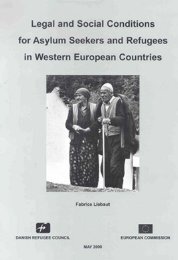Bulgaria - The social impact of seasonal migration
Bulgaria - The social impact of seasonal migration
Bulgaria - The social impact of seasonal migration
Create successful ePaper yourself
Turn your PDF publications into a flip-book with our unique Google optimized e-Paper software.
72<br />
- <strong>The</strong> applicant has submitted documents before the expiry <strong>of</strong> 12 months from the date<br />
<strong>of</strong> suspension <strong>of</strong> preceding self-employment activity permit;<br />
- <strong>The</strong> applicant has not met his/her obligations under the Compulsory Social Security<br />
Code or his/her tax obligations.<br />
5.2.4. Statistics concerning work permits<br />
From 1 January 2003 to 31 March 2003, 141 work permits have been issued in <strong>Bulgaria</strong>,<br />
<strong>of</strong> which 103 new and 38 extended permits. For comparison, from 1 January to 31<br />
December 2001 the total number <strong>of</strong> work permits issued is 512, <strong>of</strong> which 276 new and<br />
236 extended work permits.<br />
In 2002, there have been 33 investigations <strong>of</strong> the lawful employment <strong>of</strong> foreigners in<br />
<strong>Bulgaria</strong>. 29 violations have been registered, leading to 5 instructions for their<br />
amendment and 24 bills <strong>of</strong> indictment. 80 foreigners were found to be working full-time<br />
or on commission on <strong>Bulgaria</strong>n territory without a work permit. 15 <strong>of</strong> them were issued<br />
bills <strong>of</strong> indictment for administrative violation <strong>of</strong> Article 70, paragraph 1 <strong>of</strong> the Law for<br />
the Encouragement <strong>of</strong> amployment. During the same period, 7 employers have been<br />
found to employ foreigners without work permits, for which a total <strong>of</strong> 9 bills <strong>of</strong><br />
indictment have been issued.<br />
5.2.5. Regulating E<strong>migration</strong><br />
One <strong>of</strong> the main factors generating e<strong>migration</strong> from <strong>Bulgaria</strong> is the economic one. <strong>The</strong><br />
ministry <strong>of</strong> labour and <strong>social</strong> policy is attempting to regulate this movement as much as<br />
it is possible. Several measures have been undertaken to reach that end: elaboration <strong>of</strong><br />
new legislation, harmonisation <strong>of</strong> <strong>Bulgaria</strong>n legislation with the negotiation chapters 24<br />
"Co-operation in the field <strong>of</strong> justice and home affairs" (the part on "Migration") and 2<br />
"Free movement <strong>of</strong> people" <strong>of</strong> the acquis communautaire, and joining <strong>of</strong> international<br />
treaties in the field <strong>of</strong> <strong>migration</strong> and human rights. <strong>The</strong>re has been published an<br />
information brochure containing the requirements <strong>of</strong> the EU member states for entry,<br />
residence and work on their territories as well as the bilateral labour and <strong>social</strong><br />
insurance agreements. Good practices <strong>of</strong> the EU member states for regulating labour<br />
<strong>migration</strong> have been identified and accepted, and the process for signing <strong>of</strong> bilateral<br />
agreements with the member states and the 10 would-be members among the accession<br />
countries has been intensified (Stankova 2003).<br />
For the last 12 years, there operated 4 intergovernmental labour agreements <strong>of</strong> <strong>Bulgaria</strong><br />
with Germany and Switzerland through which around 20 000 <strong>Bulgaria</strong>ns managed to<br />
exercise work abroad. In addition, the <strong>Bulgaria</strong>n Employment Agency has an agreement<br />
with the Central Office for Labour Mediation in Bonn for finding jobs for <strong>Bulgaria</strong>n<br />
students during their vacation. Most active co-operation was established with Germany,<br />
which, for the last 12 years, accommodated almost all <strong>of</strong> the 20 000 <strong>Bulgaria</strong>ns having<br />
worked abroad under the agreements. <strong>The</strong> <strong>of</strong>ficial agreements are the following:<br />
• Intergovernmental agreement with the Federal Republic <strong>of</strong> Germany concerning

















